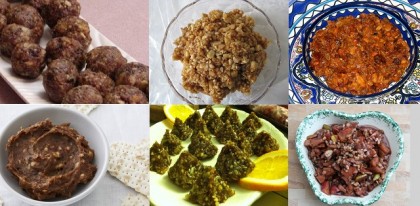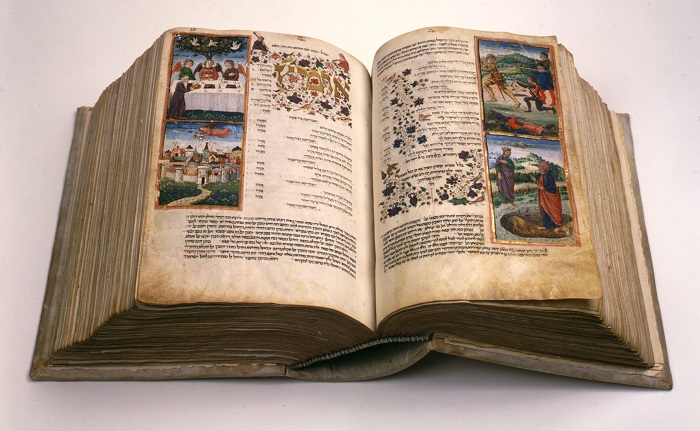Reproductor de audio
ENGLISH CORNER, CON LINDA JIMÉNEZ – This week’s trivia question: Since it’s Passover season, and a time for traditional questions and answers, I thought I’d make this week’s trivia question related to tradition, yet more enigmatic than usual. So, we know why this night is different from all other nights, but how is it the same, and yet different, all over the world?
This week we are getting ready to celebrate Passover, which begins on the evening of April 3. All over the world, Jews celebrate the liberation of the Israelites from slavery by retelling the story of the Exodus from Egypt at a special dinner, called a seder. In fact, of all the Jewish holidays, this one is the one most commonly observed, even by otherwise non-observant Jews. According to a 1990 survey done in the US, more than 80% of Jews have attended a Passover seder. A fundamental aspect of this holiday is the passing on of our history and customs to the children, who play an essential role in the ceremony. We sing traditional songs and eat traditional foods, some of which are symbolic and an integral part of the ritual.
One of these foods is charoset, the blend of fruit and nuts symbolizing the mortar which our ancestors used to build pyramids in Egypt, and it is one of the most popular foods served at the Seder. The fruit and nuts found in almost all charoset recipes refer to two verses in the Song of Songs that are closely linked with the spring season and that mention apples and nuts. The red wine recalls the Red Sea, which parted its waters for the Jews.
Since charoset is such a traditional element of Jewish food, the different ways that it is prepared in different Jewish communities show how Jewish cookery was developed by the emigration from Mediterranean countries to Eastern Europe and by ingredients that were added or discarded, based on their availability.
This week I’m going to give you a few of these very diverse recipes, so that you can appreciate just how versatile Jewish cooking has become over the ages.
INTERNATIONAL CHAROSET RECIPES
Traditional Ashkenazi:
INGREDIENTS:
6 peeled apples, chopped coarsely
2/3 cup chopped almonds or walnuts
3 tablespoons of honey, or to taste
1/2 teaspoon cinnamon
about 4 tablespoons sweet red wine
Combine everything, mixing it thoroughly. Add wine as needed. Blend or chop it to the desired texture — some people like it coarse and crunchy, others prefer it ground to a paste. Chill it before you serve it.
This will make about 3 cups.
Traditional Sephardic:
INGREDIENTS:
2 cups of pitted dates
½ cup of raisins
¼ cup of ground walnuts or almonds
½ cup of red wine
½ tsp of cinnamon
½ tsp of ginger
Cut the dates and raisins into small pieces. Put them in a bowl and mix in the ground nuts, wine and spices.
Yemenite:
INGREDIENTS:
1/2 c of slivered almonds
1/2 c of dried apricots
8 dried figs
2 tsp of ground coriander
2 tsp finely grated lime or lemon rind
1 tbs of honey
3 to 4 tbsp of sweet white wine
toasted Sesame seeds
Some people also add cinnamon, pepper, cumin, cardamom, cloves & ginger, to taste.
Chop the almonds and apricots coarsely in a food processor. Transfer them to a small bowl. Then process the figs to a fine consistancy. Stir them into the almond apricot mixture. Add the coriander, rind, honey, other spices, and enough white wine to bind the ingredients together. Refrigerate the mixture for 1 hour. Form it into balls that are about 1″ (or 2 ½ cm) in diameter. Then roll them in the sesame seeds. This recipe will make about 24 balls.
Turkish:
INGREDIENTS:
1/2 cup pitted dates
1/2 cup dried figs
1/2 cup dried apricots
1/2 cup almonds
1 apple
sweet red wine
In a food processor, finely chop the dates and half of the almonds. Remove them. Then finely chop the figs and the remaining almonds and remove. Do the same with the apricots and then with the apple. Toss everything together in a bowl. If you like, you can add a little sweet wine. Refrigerate it until 1/2 hour before serving. This will make about 2 1/2 cups.
Greek:
INGREDIENTS:
1 orange,unpeeled, with the seeds removed and cut into 8 pieces.
½ cup of seedless raisins
14 pitted dates
1/3 cup of cherry preserves
1/2 cup of sweet red Passover wine
1 tsp of ground ginger
a pinch of Cayenne pepper
2 tbs of pine nuts
Chop the orange coarsley, using a food processor. Add the raisins and dates and process until everything is finely chopped. Transfer the mixture to a medium sized saucepan and stir in the preserves, wine, ginger and cayenne. Bring it to a simmer. Cover and cook it over the lowest heat possible for 8 to 10 minutes until it’s thick, stirring it often to prevent any sticking.Stir in the pine nuts.This makes about 1 1/4 cups. It can be kept refrigerated up to 1 week, so you can make it ahead of time.
Persian:
INGREDIENTS:
25 dates, pitted and diced
1/2 cup of unsalted pistachios
1/2 cup of almonds
1/2 cup of seedless golden raisins
1 1/2 peeled apples, cored and diced
1 pomegranate
1 orange, peeled and diced
1 banana, sliced
½ to 1 cup of sweet red wine
1/4 cup of cider vinegar
1/2 tablespoon of cayenne
1 tablespoon of ground cloves
1 tablespoon of ground cardamom
1 teaspoon of cinnamon
1 tablespoon of black pepper
Combine all the fruits and nuts. Add the wine and vinegar until you get a pasty consistency. Add the spices and blend well. Adjust the seasonings to taste. This makes 5 cups.
Venetian:
INGREDIENTS:
1 1/2 cup chestnut paste
10 ounce dates, chopped
12 ounce figs, chopped
2 tablespoon poppy seeds
1/2 cup chopped walnuts
1/2 cup chopped almonds
1/2 cup pine nuts
grated rind of 1 orange
1/2 cup golden raisins
1/2 cup chopped dried apricots
1/2 cup brandy
honey, to bind
Combine all the ingredients, using just enough honey and brandy to make everything bind together. This makes about 4 cups.




